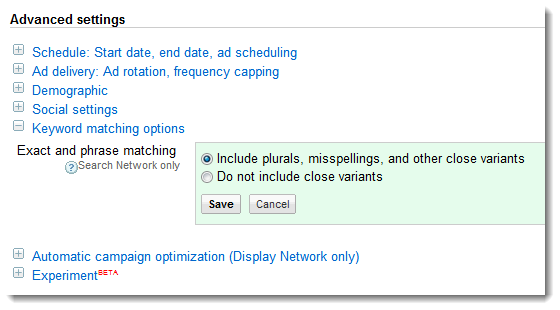Starting in mid-May, Google AdWords will have new meanings for phrase match and exact match, to "include plurals, misspellings, and other close variants". This will be the new default setting, however, you also have the option to revert back to the traditional setting for phrase and exact match keywords.
You can toggle between these two options at the bottom of your campaigns' Settings tab, under "Keyword matching options".

My Take
I see this change to be good overall for several reasons.
- Time - The new matching behaviour is more flexible, saving time when building out new campaigns, and when managing existing keywords within an account. Rather than mining for all the low search volume variants of high quality keywords, you can spend your time optimizing the account in other ways.
- Simplicity - Fewer unnecessary keywords results in simpler campaign builds that are more manageable, yet are still insightful and actionable. A list of what is essentially the same keyword, becomes aggregated into a single, useful keyword.
- The Rise of Misspellings - Google estimates that at least 7% of searches contain a misspell, and that percentage increases with longer queries. We also know that the average length of a search query is becoming longer over time.
- Maximizing Opportunity - While broad match is fairly open, phrase and exact match are generally restrictive enough such that the clicks you receive are well-targeted anyway. With that in mind, opening up phrase and exact match to include plurals/misspellings/variants should help to maximize on the opportunities from those phrase/exact keywords.
The Caveats
Although the new matching behaviour is good overall, there are some things you should be looking out for.
- Search Query Reports - SQRs are more frequently used to see what search queries are being matched on for broad match keywords. However, with phrase and exact match keywords becoming more broad, make sure to check which search terms are matching on your phrase/exact keywords. If you see any plurals/misspells/variants that you do not want to match on, simply add it to your negative keyword list.
- Impact on Broad - Since the matching behaviour of phrase and exact match is changing, that indirectly affects the performance of broad match keywords. You may start to see some volume for broad keywords decrease, along with declining conversion metrics, as high quality search queries are matched on phrase/exact keywords.
For more information on this change, visit Google's Inside AdWords blog post.
